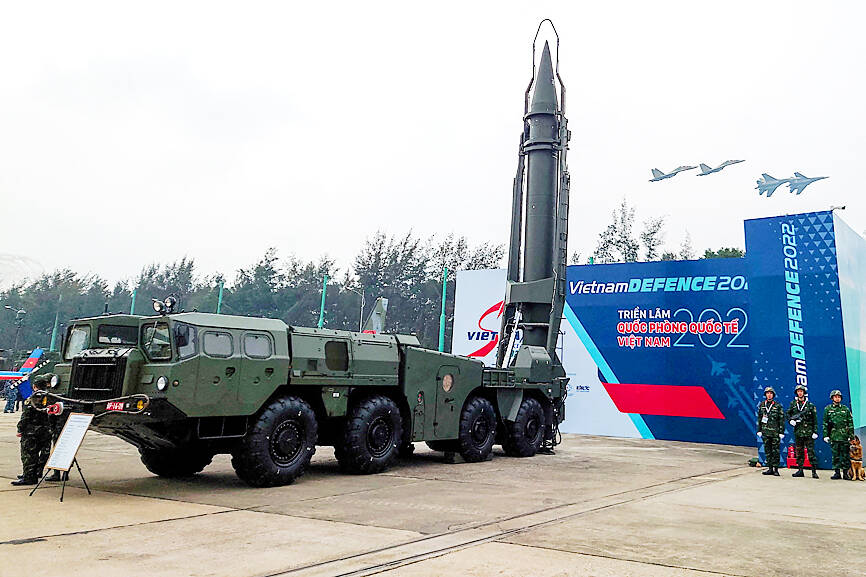Vietnam’s imports of weapons last year slowed to a trickle as it worked to diversify supplies away from Russia, data released on Monday showed, while experts said the country could be vulnerable during a regional conflict.
Despite an estimated budget of more than US$1 billion annually for arms imports, last year it placed no new major orders, data released on Monday by defense think tank the Stockholm International Peace Research Institute (SIPRI) showed.
The main delivery was a naval corvette donated by India, the data showed, making last year’s arms imports Vietnam’s lowest by volume since 2007 — other than 2020 during the COVID-19 pandemic.

Photo: Reuters
Amid rising tensions between China and Taiwan, and frequent skirmishes in the South China Sea between Chinese vessels and ships from other regional powers, Vietnam lacks enough modern weaponry to defend itself in a large-scale conflict, defense experts said.
“The disparity in conventional military power will increase in China’s favor if Vietnam continues to mark time,” said Carl Thayer, a senior expert in Vietnam security at the Australian Defence Force Academy in Canberra.
The Vietnamese government declined to comment on the reasons for the apparent slowdown.
A top Vietnamese defense official in January said that the country had reached several deals at a military fair in December 2022, but the Vietnamese Ministry of Defense did not elaborate.
The lack of public deals might be the result of ongoing hard negotiations, with Vietnam considering competing offers, SIPRI senior researcher Siemon Wezeman said.
The Southeast Asian nation mostly needs warships, fighter jets and drones, Thayer and other experts said.
It operates air defense systems imported from Russia and Israel, some of which were first introduced more than 30 years ago, a 2019 report from the defense ministry said.
Hanoi is trying to improve its own military industry, but cannot yet produce large weapons, such as aircraft or ships.
Russia, for decades Vietnam’s top provider of weapons, markedly reduced its global arms exports last year, SIPRI data showed, and Vietnam has struggled to pay for Russian weapons without breaching US sanctions, two people briefed on the discussions said.
They declined to be named because of the sensitivity of the matter.
Hanoi held its first international arms fair in 2022, saying publicly that it wanted to diversify its supplies from Moscow, confirming a shift that began after Russia annexed Crimea in 2014, according to public data.
However, talks with other potential sellers have not yet produced visible results.
Israel, Vietnam’s No. 2 arms supplier, has not sold Hanoi any weapons in the past two years, SIPRI data showed, even though Israel’s global arms exports have increased in that period.

CHIPMAKING INVESTMENT: J.W. Kuo told legislators that Department of Investment Review approval would be needed were Washington to seek a TSMC board seat Minister of Economic Affairs J.W. Kuo (郭智輝) yesterday said he received information about a possible US government investment in Taiwan Semiconductor Manufacturing Co (TSMC, 台積電) and an assessment of the possible effect on the firm requires further discussion. If the US were to invest in TSMC, the plan would need to be reviewed by the Department of Investment Review, Kuo told reporters ahead of a hearing of the legislature’s Economics Committee. Kuo’s remarks came after US Secretary of Commerce Howard Lutnick on Tuesday said that the US government is looking into the federal government taking equity stakes in computer chip manufacturers that

NORTHERN STRIKE: Taiwanese military personnel have been training ‘in strategic and tactical battle operations’ in Michigan, a former US diplomat said More than 500 Taiwanese troops participated in this year’s Northern Strike military exercise held at Lake Michigan by the US, a Pentagon-run news outlet reported yesterday. The Michigan National Guard-sponsored drill involved 7,500 military personnel from 36 nations and territories around the world, the Stars and Stripes said. This year’s edition of Northern Strike, which concluded on Sunday, simulated a war in the Indo-Pacific region in a departure from its traditional European focus, it said. The change indicated a greater shift in the US armed forces’ attention to a potential conflict in Asia, it added. Citing a briefing by a Michigan National Guard senior

POWER PLANT POLL: The TPP said the number of ‘yes’ votes showed that the energy policy should be corrected, and the KMT said the result was a win for the people’s voice The government does not rule out advanced nuclear energy generation if it meets the government’s three prerequisites, President William Lai (賴清德) said last night after the number of votes in favor of restarting a nuclear power plant outnumbered the “no” votes in a referendum yesterday. The referendum failed to pass, despite getting more “yes” votes, as the Referendum Act (公民投票法) states that the vote would only pass if the votes in favor account for more than one-fourth of the total number of eligible voters and outnumber the opposing votes. Yesterday’s referendum question was: “Do you agree that the Ma-anshan Nuclear Power Plant

ENHANCED SECURITY: A Japanese report said that the MOU is about the sharing of information on foreign nationals entering Japan from Taiwan in the event of an emergency The Ministry of Foreign Affairs yesterday confirmed that Taiwan and Japan had signed an agreement to promote information exchanges and cooperation on border management, although it did not disclose more details on the pact. Ministry spokesman Hsiao Kuang-wei (蕭光偉) said the ministry is happy to see that the two nations continue to enhance cooperation on immigration control, in particular because Taiwan and Japan “share a deep friendship and frequent people-to-people exchanges.” “Last year, more than 7.32 million visits were made between the two countries, making it even more crucial for both sides to work closer on immigration and border control,” he said. Hsiao